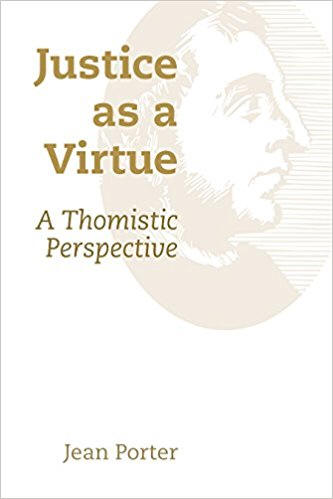Book Review
Justice as a Virtue: A Thomistic Perspective
Jean Porter
Wm. B. Eerdmans Publishing Company (31 Dec 2016)
ISBN: 978-0802873255
 Jean
Porter is a moral philosopher whose ethical views are often at variance
with mine. Having said that, I am grateful for her previous works as they
showed me that Aquinas is a fine virtue ethicist. In this very readable
but sometimes technical (for the non-specialist) work, she shows us that
Aquinas has a wonderfully rich grasp of the virtue of justice, richer than
that of many a more recent philosopher, John Rawls included.
Jean
Porter is a moral philosopher whose ethical views are often at variance
with mine. Having said that, I am grateful for her previous works as they
showed me that Aquinas is a fine virtue ethicist. In this very readable
but sometimes technical (for the non-specialist) work, she shows us that
Aquinas has a wonderfully rich grasp of the virtue of justice, richer than
that of many a more recent philosopher, John Rawls included.
For Aquinas, says Porter, justice is a personal virtue and not merely a virtue of social institutions. Justice is also a perfection of the will: it is not a matter of simple knowing but doing. It directs us in our relations with others according to a kind of equality. This equality is because of the equality of all humans as rational beings and the section on equality was very helpful.
What is the relation between intellect and will? Porter argues that the will for Aquinas is not simply an undifferentiated capacity for desire but is the central organizing appetite of rational beings. The will has its own proper tendencies towards certain kinds of aims which reason must respect. This is very different indeed form the current ideas surrounding the principle of autonomy. Freedom belongs to the rational person and is grounded in reality. There are objective truths that must be respected. To put it another way, freedom for Aquinas does not mean do as I like as long as I do not harm anyone. Freedom has much more to do with the perfection of the virtues. But how do I act justly in a given set of circumstances? By practical reason perfected by the virtue of prudence. Free persons have dominion over their acts and the acts are ordered to an ultimate end. We have a right to pursue this ultimate end and we have the means to do so by the human capacities of rationality, freedom and self-determination. In contrast, animals do not exercise deliberation and choice because they do not act in accordance with free judgment.
Aquinas's account of justice presupposes the objective value of other persons. More than any other virtue, justice requires that there be others who are owed rights so that a person perfects his own virtue of justice. Whatever is good for oneself is good for the community: the good community enacts laws that will be of benefit to all.
There is a helpful discussion of general justice and particular justice, that is, the virtue that governs our relationship with everyone and particular individuals. Particular justice directs us not to the common good as such but to the good of individuals. General justice gives us general precepts, for example, do not steal. We also need particular justice because no situation requiring justice is the same.
There is also the distinction between distributive and commutative justice. The former concerns the way in which collective goods are fairly distributed, what society owes the individual. The latter concerns dealings between individual persons: one pays back what is owed to a particular person.
It would appear that Aquinas, like later philosophers, speaks of rights. But these rights are a species of the virtue of justice. The standard for the state and each person is the natural law: what is good and what is evil is not predicated upon my desires but by the external standard set upon me by my rational nature. How very different this is from the rights talk proclaimed by the Enlightenment philosophers.
In conclusion, a very worthwhile commentary on the Thomistic account of the virtue of justice.
Reviewed by Dr Pravin Thevathasan
